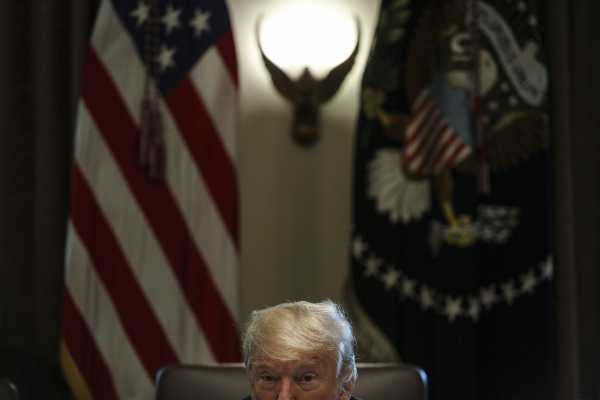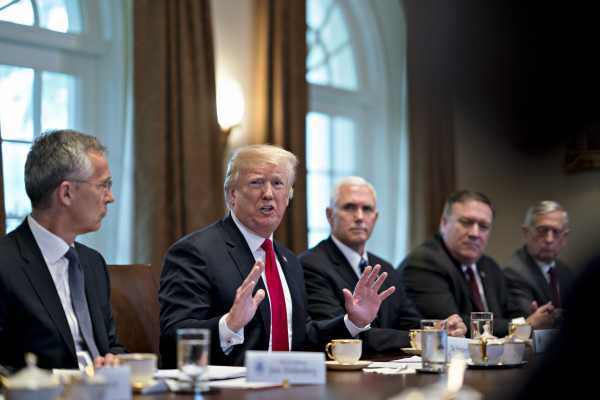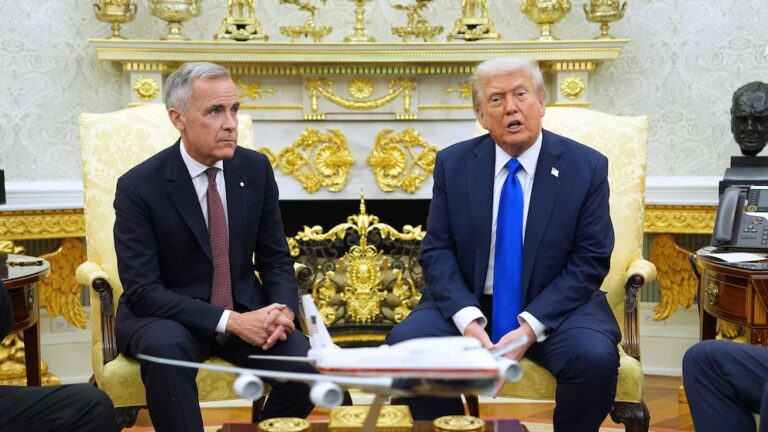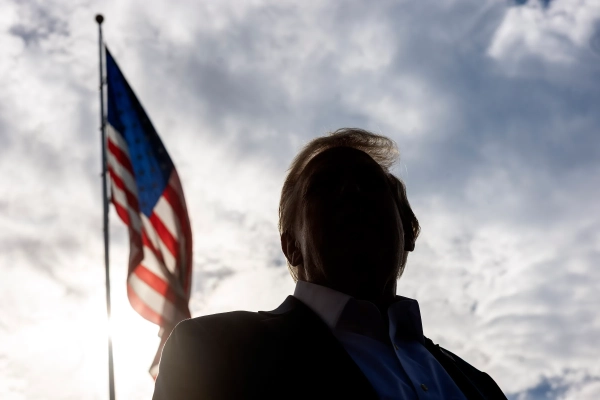
An anonymous Trump official set off a ferocious debate on Wednesday about whether White House insiders who are trying to thwart the president are actually collaborators, not members of a “resistance.”
The official writes in the New York Times that he or she is one of many “working diligently from within to frustrate parts of [President Trump’s] agenda and his worst inclinations.”
The motives of the author were immediately questioned, and reasonably so. But I’m less interested in that question than in the substantive one the article raises: Should this person just quit? Or is it good for people who are aware of Trump’s dangers to stay on inside the administration and try to undermine him from within?
On this point, I think the op-ed author is actually in the right. Given the stakes here — up to and including literal nuclear war — there need to be some people working quietly to prevent the worst from happening.
Perhaps, at one point in the future, they will be in a position to do more: when Republicans are willing to actually do something about Trump. But right now, a weak resistance is better than no resistance at all.
The ethics of “collaboration”
The root cause of this crisis is that the Republican Party has chosen to back an unfit and dangerous president for crass political reasons. They’re getting the policies they want, including a massive tax cut bill. Why challenge him? There is no reason to believe that one official coming out and condemning Trump as a threat to democracy, or even several, will change the minds of people like Senate Majority Leader Mitch McConnell, who know Trump’s worst habits full well.
This forces well-meaning Trump officials into a terrible choice. They can quit and potentially let Trump staff the White House with cronies and yes men, or stay and do their best to undermine him where they can. This could potentially cause irreparable damage to American democracy, a major war, or a global economic crisis. It could lead to all three at once.
The nasty spin on this is that it’s “collaboration,” morally similar to helping Nazis round up Jews, justifying it to yourself by perhaps letting a few people get away. But this isn’t Vichy France, and these advisers aren’t solely helping implement terrible Trump policies. They are actually blocking some of these policies from coming into existence, especially the worst ones, rather than implementing them and trying to make them better on the margins.
Another salient difference is that the United States is, rather than a fascist vassal, an advanced democracy. Trump is up for reelection in two years and may lose his congressional majorities in two short months. You’re not indefinitely helping an occupying power, but rather holding the line until the legitimate political process has a chance to curb Trump’s excesses.
To be clear: They have not always succeeded. And we don’t know if the author, or anyone else, has even truly tried, or wanted to try, to do much to help immigrants, refugees, the people of Puerto Rico, Obamacare enrollees, or any of the other groups of people whose lives are imperiled by the administration and Trump specifically.
Still, a vast swath of the bureaucracy appears to be on the dissenting official’s side. They have a real opportunity to contain the consequences of the last election until they can be reversed. It’s less being a collaborator than being a saboteur.
Given the nearly unimaginable stakes here, it would be too dangerous for everyone of goodwill to abandon the ship of state. We need utilitarians in the room to mitigate the risks of a true disaster.
For example: It’s easy to forget now, but the United States and North Korea were on the brink of war as recently as December.
Trump spent the second half of 2017 threatening Pyongyang with “fire and fury,” undercutting then-Secretary of State Rex Tillerson’s efforts to negotiate, and tweeting implied threats to launch a war against the North. Sen. Chris Murphy (D-CT) told me in December that the Defense Department had quietly ramped up preparations for war, and that he had become worried about “Trump’s willingness to launch a preemptive strike.”
Axios reported that the president had a “fixation” on the idea of attacking North Korea, constantly bringing it up in meetings. “There is a reason the harshest assessments of Trump usually leak after North Korea meetings,” Axios’s reporters wrote ominously.
A war between North Korea and the United States, according to our best guesses, would likely have cost millions of lives. Yet instead of a conflict, we got rapprochement — a summit and sham deal between Trump and Kim Jong Un that seems to have moved us off of war footing (for now). But we still don’t really know why things went down this way.
There are very few practical checks on the executive branch’s ability to initiate force. If Trump had decided he wanted to follow through on his threats, he could have ordered a strike on North Korea’s nuclear facilities. But for some reason, he changed his mind.
Was that the work of the op-ed writer, or one of their allies in the White House? I have no idea. But there’s at least some chance it was. We know that because there are concrete examples of Trump’s advisers preventing catastrophe.
The “resistance” has worked, kind of

The author of the op-ed doesn’t go into detail about how he or she can assert the various claims in the piece. There are no specific examples of awful Trump ideas they’ve personally stopped, perhaps because doing so would blow their cover. It’s impossible to evaluate this person’s particular role in all of this, and I won’t try.
But the past two years of reporting has actually uncovered concrete examples of Trump’s staff doing as the author suggests — “thwarting Mr. Trump’s more misguided impulses.”
Last June, per the New York Times, White House counsel Don McGahn refused a direct order to fire special counsel Robert Mueller. McGahn also cooperated with the Mueller investigation and sometimes didn’t tell Trump what he was doing.
Axios reports that White House Chief of Staff John Kelly controlled the flow of information to the president, blocking conspiracy theorists like Infowars’ Alex Jones or right-wing trolls like Chuck Johnson from getting in the president’s ear.
Bob Woodward’s new book has two particularly alarming anecdotes along these lines, both relating to foreign policy. In one case, Secretary of Defense James Mattis had to convince Trump that trying to assassinate Syrian dictator Bashar al-Assad — a move that would arguably be illegal and might set off a dangerous confrontation with Russia — was a bad idea.
In another, former National Economic Council chair Gary Cohn stopped Trump from withdrawing from the US-Korea Free Trade Agreement, a policy that would have wreaked havoc on the alliance and American businesses, by stealing the letter that would have ordered withdrawal from his desk (literally).
Think about what could have happened if Trump got his way in these cases: a constitutional crisis, a war, economic pain. If it weren’t for people who understood the possible consequences, then everything could have been a lot worse.
Those are just some examples that we know of, most of which I brainstormed with my colleagues in about five minutes. There are more in the public record, and probably a lot more that we don’t actually know about.
This doesn’t mean that Trump’s worst policies have all been stopped. We still got the travel ban, family separation, withdrawal from the Paris climate accords, pointless and dangerous undercutting of Obamacare — all of which can and have caused real pain. I don’t want to underplay any of that.
But as bad as things are — and they are are very bad — it’s easy to imagine them being worse.
We need to focus on reality
Former George W. Bush speechwriter David Frum, a critic of the op-ed, argues for resignation in the op-ed at the Atlantic:
While this is noble in theory, what evidence is there to persuade Republicans in Congress, who have gone along knowing full well who Trump is, to impeach him? Why would it matter if the op-ed were signed? What on earth does “resign in a way that will count” mean?
Invoking the 25th Amendment, a possible constitutional solution to ousting Trump, is far harder than it sounds. It would require the vice president and a majority of the Cabinet to decide that the president was incapacitated. In response, Trump could simply refuse to accept the outcome — in which case, the issue gets kicked to the GOP-controlled Congress, which would require a two-thirds vote to remove Trump from office. It’s not a simple process.
Other observers, including a number of liberals, have termed what the op-ed describes as a kind of soft coup, worrying that it constitutes a threat to the health of American democracy. I get the concern: If Trump’s deputies had quietly deposed him and he were merely functioning as a figurehead, then it really would be a threat to democracy.
But clearly, that’s not what’s happening. Naunihal Singh, a political scientist and one of America’s leading experts on coups, argues that the current situation is not at all a coup, but rather an extension of ordinary bureaucratic politics to extraordinary times. “This is an extreme form of things we see often, when cabinet secretaries or military officers attempt to steer policy ‘from below’ by limiting information flow to the President,” Singh writes.
“Have we seen this before? Yes, mainly when presidents are incapacitated,” he explains. “It’s the sort of thing you can pull off only when the center is so weak that everybody grabs at power. Sick President Syndrome. Lame or dead duck.”
The United States is currently governed by a man who is so unfit for office that his White House functions as if he is in the hospital. But he isn’t going to die or get better, in the way a physically ill president might. And the constitutional remedies for a situation like this — impeachment, the 25th Amendment — do not seem like plausible options at this particular moment in time. So the Trump aides who recognize reality are stuck with quiet resistance.
The most persuasive criticism of the op-ed isn’t that the author is doing something wrong in the White House, but that going public in the form of an op-ed itself endangers their quiet anti-Trump insurgency.
“If you were really concerned about protecting the country from an erratic Trump — rather than, say, trying to pre-salvage your post-administration reputation — you probably wouldn’t write something like this given its predictable consequences,” Cato Institute scholar Julian Sanchez tweeted.
“I can pretty much guarantee that this: (1) Triggers an epic tantrum and makes Trump even more paranoid than he already is, & (2) Sets off a mole-hunt that results in suspiciously competent persons being purged & replaced with loyalist nuts and/or Trump family members.”
Maybe the article wasn’t written by someone resisting Trump at all, and is just an attempt at revisionist history. Even if it’s not, Sanchez’s conclusion stands that it probably wasn’t a wise move to write it.
But it was written and it was published, so here we are. We have to hope that the author manages to rally other “resistance” members, or even inspires other Trump administration officials to join.
Is that naive? Probably. But in dark times, we cling to the shreds of hope we’ve got.
Sourse: vox.com






